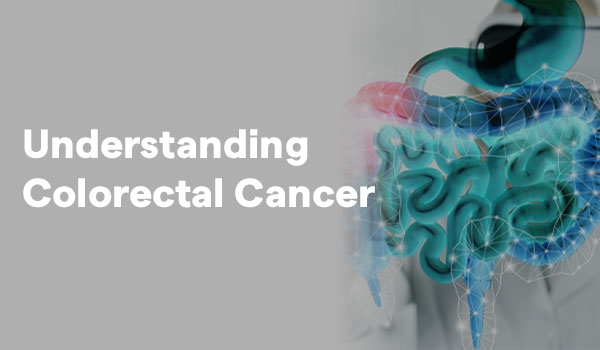
The colon is the longest part of the large intestine, one of the most important parts of the human digestive system. Here cancer begins with sudden and rapid multiplication and growth of polyps (small clumps of cells) in the inner lining of the rectum and colon, with time these cells develop into cancerous cells that can only be prevented by regular checkups/screenings and treatment.
Colorectal cancer means cancer that begins either in the colon or rectum. Both of these cancers are sometimes grouped and called colorectal cancer. The colon or large intestine is the large bowel which is the main part of the large intestine and the rectum is the channel that joins the colon to the anus. Cancer of the colon and rectum usually develops from a mass of tissue called polyps in the colon wall. While some forms of polyps can be potentially dangerous and transform into cancer later, not all polyps are cancerous. Screening can identify polyps that can then be removed, or risks occur that can lead to polyps becoming cancerous.
Colon and rectal cancer together form one of the three most prevalent cancer types in men and women in the world. The lifetime chance of acquiring colorectal cancer was estimated at 23 percent for males and 25 percent for females.
Essentially, this is a progressive pathological condition with the incidence rate rising with age; the overwhelming majority of those affected are 50 years old or older.
Interestingly, if colorectal cancer is diagnosed before it has spread to other organs, then the five-year survival rate is about 90%. However, only a quarter of patients presenting colorectal cancer have the cancer diagnosed at this early stage.
Several risk factors can increase an individual’s chance of developing colorectal cancer including age factors that is; people over the age of 50 years are more susceptible to being diagnosed with colorectal cancer. Another major risk factor is a history of polyps or cancer of the colon or rectum.
A person who has symptoms of colorectal cancer may become lightheaded, short of breath, or have severe stomach cramps, stomach pain, or pelvic pain during bowel movements; they might also feel full quickly when eating, vomiting, change the color of stool, have lighter bowel movements than normal, have a burning feeling or urgency to defecate. Though the above could be signs of any other disorder, they could also be symptoms of other afflictions. That is why it is important to be tested for colorectal cancer even though there may be no signs or symptoms.
Several screening tests can be used to identify colorectal Cancer in its early stages or even identify pre-malignant polyps. These include:
If colorectal cancer is diagnosed, treatment depends on the stage of the cancer. Tumors that are not widespread and right from developing are frequently treated through operation. Chemotherapy may also be used after the surgery to eliminate all cancer cells that might be remaining in the body. It can also be cured by using chemotherapy, radiation therapy, or targeted drug therapy for advanced-stage cancer. Some of the immunotherapy drugs are known to enhance the capacity of the immune system to destroy body tissues with cancer cells.
Therefore, colorectal cancer is a common cancer in the world but it is also one of the preventable and curable cancers if the disease is diagnosed early. Procedures that can identify polyps or early cancers should be initiated at 45-50 years. A good diet, including fruits, vegetables, and fiber, which are foods high in fiber and low in fats, can decrease the incidence of colorectal cancer.
Whenever patients develop symptoms they ought to seek medical attention. It has been found that many patients diagnosed with this type of cancer are curable if the disease is detected at an early stage and the appropriate treatment is embarked on. It is therefore important to keep on being conscious of this illness and carry out more studies to enhance the prevention, screening, and treatment efforts. For more information on colorectal cancer, book an appointment at Sir Ganga Ram Hospital today.